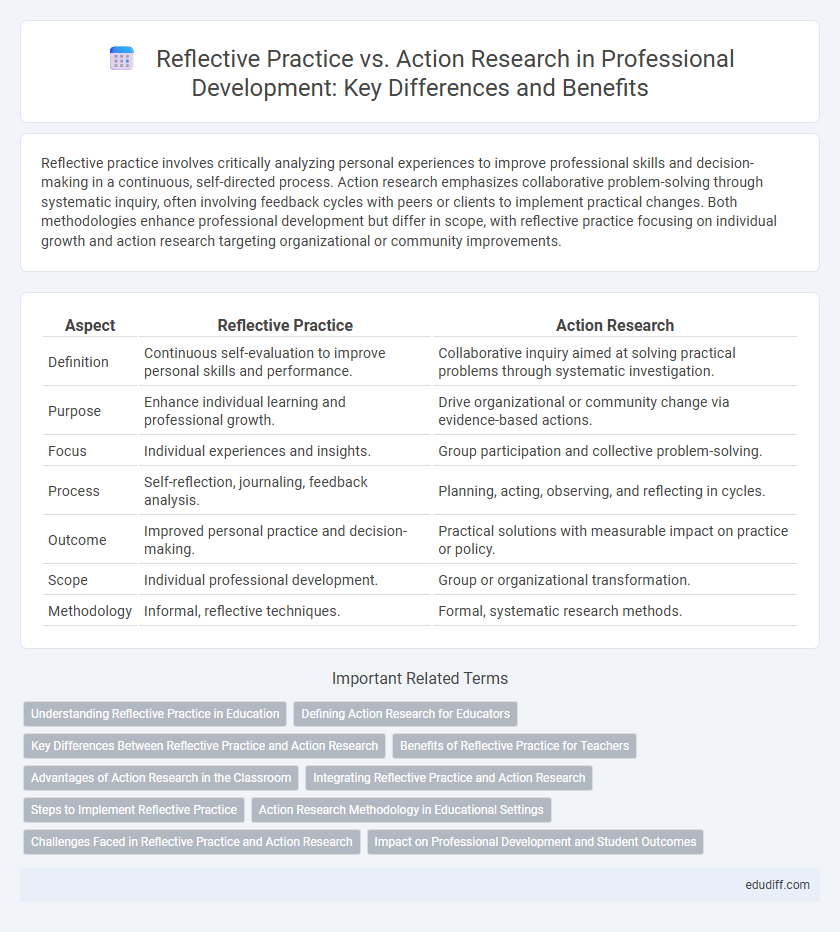Reflective practice involves critically analyzing personal experiences to improve professional skills and decision-making in a continuous, self-directed process. Action research emphasizes collaborative problem-solving through systematic inquiry, often involving feedback cycles with peers or clients to implement practical changes. Both methodologies enhance professional development but differ in scope, with reflective practice focusing on individual growth and action research targeting organizational or community improvements.
Table of Comparison
| Aspect | Reflective Practice | Action Research |
|---|---|---|
| Definition | Continuous self-evaluation to improve personal skills and performance. | Collaborative inquiry aimed at solving practical problems through systematic investigation. |
| Purpose | Enhance individual learning and professional growth. | Drive organizational or community change via evidence-based actions. |
| Focus | Individual experiences and insights. | Group participation and collective problem-solving. |
| Process | Self-reflection, journaling, feedback analysis. | Planning, acting, observing, and reflecting in cycles. |
| Outcome | Improved personal practice and decision-making. | Practical solutions with measurable impact on practice or policy. |
| Scope | Individual professional development. | Group or organizational transformation. |
| Methodology | Informal, reflective techniques. | Formal, systematic research methods. |
Understanding Reflective Practice in Education
Reflective practice in education emphasizes continuous self-assessment and critical analysis of teaching methods to enhance professional growth and student outcomes. It fosters deeper awareness of classroom dynamics and personal instructional strategies through systematic reflection on experiences. This ongoing process supports adaptive learning environments by encouraging educators to identify challenges and implement thoughtful improvements.
Defining Action Research for Educators
Action research for educators is a systematic inquiry process aimed at improving teaching practices and student outcomes through iterative cycles of planning, acting, observing, and reflecting. This method involves educators collaboratively identifying problems, implementing strategies, and analyzing data to inform instructional decisions and foster continuous professional development. Emphasizing practical solutions, action research bridges theory and practice by empowering teachers to create meaningful changes in their classrooms.
Key Differences Between Reflective Practice and Action Research
Reflective practice centers on individual self-assessment to enhance professional skills through ongoing personal reflection, while action research involves collaborative problem-solving with cycles of planning, acting, observing, and reflecting to drive organizational change. Reflective practice is primarily introspective and continuous, whereas action research is systematic, cyclical, and oriented toward collective outcomes and evidence-based improvements. Key differences include the scope--personal growth versus group intervention--and methodology, with action research employing formal data collection and analysis for informed decision-making.
Benefits of Reflective Practice for Teachers
Reflective practice empowers teachers to critically analyze their instructional methods, fostering continuous improvement and professional growth. This process enhances self-awareness, enabling educators to identify strengths and address challenges effectively in diverse classroom settings. By integrating reflective practice, teachers cultivate adaptive strategies that improve student engagement and learning outcomes.
Advantages of Action Research in the Classroom
Action research in the classroom enhances teaching effectiveness by fostering continuous improvement through systematic inquiry and real-time data collection. It empowers educators to identify specific challenges, implement targeted interventions, and measure outcomes for immediate adjustments. This cyclical process promotes collaborative learning and evidence-based decision-making, leading to sustained positive impacts on student engagement and achievement.
Integrating Reflective Practice and Action Research
Integrating reflective practice and action research enhances professional development by combining systematic inquiry with continuous self-evaluation, fostering deeper insights and practical improvements. Reflective practice encourages ongoing critical self-assessment, while action research provides a structured methodology for testing changes and measuring outcomes in real-time. Together, they create a dynamic feedback loop that supports evidence-based decision-making and sustained organizational learning.
Steps to Implement Reflective Practice
Implementing reflective practice involves systematically observing and analyzing one's professional actions to enhance learning and improve performance. Key steps include maintaining a reflective journal to document experiences, critically evaluating outcomes and emotional responses, and setting actionable goals for continual improvement. Engaging in regular peer discussions and feedback loops further deepens insight and supports evidence-based adjustments in practice.
Action Research Methodology in Educational Settings
Action Research methodology in educational settings involves a cyclical process of planning, acting, observing, and reflecting to improve teaching practices and student outcomes. This participatory approach enables educators to identify challenges, implement interventions, and analyze data collaboratively within their classrooms or schools. Emphasizing practical solutions and iterative learning, Action Research fosters continuous professional development and evidence-based decision-making in education.
Challenges Faced in Reflective Practice and Action Research
Reflective practice faces challenges such as personal bias, lack of structured methodology, and difficulties in measuring outcomes, which can hinder objective self-assessment and professional growth. Action research encounters obstacles including time constraints, the complexity of collaborative efforts, and balancing practical interventions with rigorous data collection. Both approaches demand commitment to continuous learning despite these practical and methodological barriers.
Impact on Professional Development and Student Outcomes
Reflective practice fosters continuous self-assessment and personal growth, enhancing educators' ability to adapt teaching strategies to diverse learning needs, which leads to improved student engagement and achievement. Action research involves systematic inquiry and data-driven decision-making, promoting collaborative problem-solving and evidence-based interventions that directly elevate instructional effectiveness and student outcomes. Both methodologies contribute significantly to professional development by encouraging critical thinking and reflective analysis, ultimately driving sustained improvements in educational practices.
Reflective Practice vs Action Research Infographic

 edudiff.com
edudiff.com